|
|
 |
|
Illegally parked cars will be towed away at the owner’s expense |
|
The Passive Voice in English:
In the “normal,” active voice, the subject of the sentence acts upon an object:
She snubs him.
Both German and English offer an alternative verb structure, the passive voice, in which the subject of the sentence receives the action:
He is snubbed by her. To transform the active to the passive, we turn the direct object “him” into the grammatical subject “he” and place it in the customary first position. The active verb, “snubs,” becomes the past participle (“snubbed”), and “to be” is inserted as the auxiliary verb: thus
She snubs him becomes
He is snubbed.
(Colloquial English sometimes uses “to get” as the auxiliary verb, as in: “He gets snubbed all the time.”)
One purpose of the passive voice is avoid identifying the active subject –
“Mistakes were made” – but if we do want to retain that information, we put it into a prepositional phrase:
He is snubbed by her.
The passive sentence’s tenses are achieved through manipulation of the auxiliary verb:
He was snubbed. He is being snubbed. He had been snubbed. He will be snubbed. Etc.
|
|
 |
|
Stealing newspapers is a punishable offence and will be reported. |
|
The Passive Voice in German:
German uses a similar structure for the passive, but with “werden” as the auxiliary verb. Here the accusative object of the action becomes the nominative subject:
Ich sehe dich. -> Du wirst gesehen.
| Du wirst beobachtet. |
You are being observed. |
| Hier wird nur Deutsch gesprochen. |
Only German is spoken here. |
| Goethes Name wird mit “oe” geschrieben. |
Goethe’s name is written with “oe”. |
| Wir werden nicht ganz verstanden. |
We aren’t being totally understood. |
Tenses in the Passive Voice.
As is English, we change tenses through the auxiliary verb (“werden”). Of course, “werden” takes “sein” in the perfect tenses. The only difference comes in the past participle: instead of “geworden” we use “worden”:
| Present |
Du wirst beobachtet. |
You are being observed. |
|
Der Wagen wird abgeschleppt. |
The car is being towed. |
|
Der Diebstahl wird angezeigt. |
The theft is being reported. |
|
| Simple Past |
Du wurdest gesehen. |
You were seen. |
|
Ein Fehler wurde begangen. |
A mistake was made. |
|
Rom wurde nicht an einem Tag erbaut. |
Rom wasn’t built in a day. |
|
|
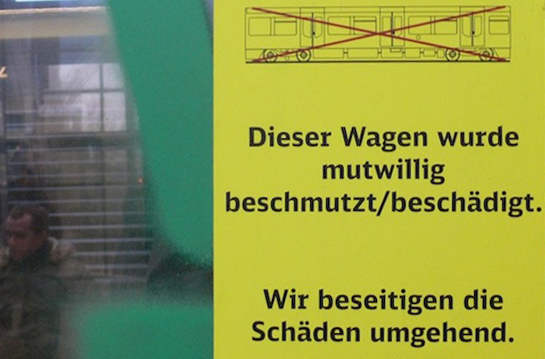 |
|
This (subway)car was maliciously dirtied/damaged. We will fix the damages promptly. |
|
| Present Perfect |
Du bist gesehen worden. |
You were seen. |
|
Es ist alles vergessen worden. |
Everything has been forgotten. |
|
Ihr Mann ist verhaftet worden. |
Her husband has been arrested. |
|
| Past Perfect |
Der Film war schon zweimal gezeigt worden. |
The film had already been shown twice. |
|
Das Essen war schon vorbereitet worden. |
The meal had already been prepared. |
|
| Future |
Du wirst erwischt werden. |
You’ll get caught. |
|
Das Buch wird gekürzt werden. |
The book will be shortened. |
|
| Future Perfect |
Alles wird vor Montag in Ordnung gebracht worden sein. |
Everything will have been put in order by Monday. |
The Passive Voice with Verbs That Take the Dative Case:
Verbs that take the dative case, even when a direct action is implied, require a different structure, with the dative retained:
Sie hilft mir ->
Mir wird von ihr geholfen. Note that “mir” is not the grammatical subject; there is an understood “es.” In fact, the sentence could also read:
Es wird mir geholfen. (See the discussion of the introductory “es” below).
|
|
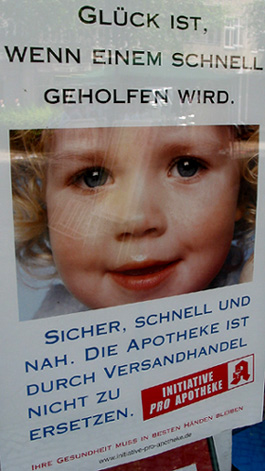 |
|
Happiness is being helped quickly. Safe, fast, and close by. The pharmacy cannot be replaced by mail order. |
|
Modals in the Passive Voice:
As is English, a modal auxiliary is normally the finite verb in the passive:
| Etwas muss getan werden. |
Something must be done. |
| Das darf nicht öffentlich gesagt werden. |
That’s not allowed to be said publicly. |
| Er soll bestraft werden. |
He ought to be punished. |
And in the the simple past:
| Sie wollte bewundert werden. |
She wanted to be admired. |
| Ihm konnte nicht geholfen werden. |
He couldn’t be helped. |
| Die Wohnung sollte geräumt werden. |
The apartment was supposed to be vacated. |
The future tense:
| Das wird repariert werden müssen. |
That will have to be fixed. |
| Das wird von den Kindern gemacht werden können. |
That will be able to be done by the children. |
It
is possible to put the modal into a perfect tense, but the result can seem awkward (especially in the future perfect, for which no example will be given):
| Etwas hat gesagt werden können. |
Something could have been said. |
| Er hatte fotografiert werden müssen. |
He had had to be photographed |
“von” and “durch”:
|
|
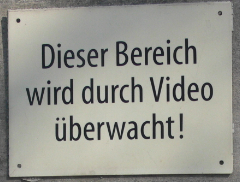 |
|
The area is under video surveillance. |
|
If we still want to identify the active subject, we put the information into a prepositional phrase, usually with “von” – which of course takes the dative case:
Du wirst von mir gesehen.
The preposition “durch” can be used when the active subject is an instrument of the action, rather than an initiator:
Er wird durch eine Explosion geweckt (He is awakened by an explosion).
Berlin wurde durch eine Mauer geteilt (Berlin was divided by a wall). Of course
durch takes the accusative, as always. As with the English “with,” “mit” can be used to indicate a tool used to carry out the action:
Die Tür wurde mit einem Schlüssel geöffnet (The door was opened with a key).
|
|
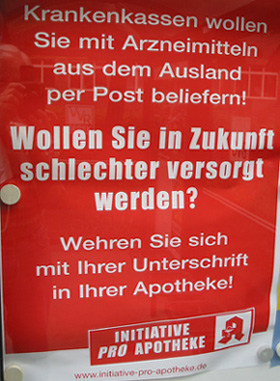 |
|
Health insurers want to supply your medicines from other countries by mail! Do you want your future medical care to be worse? Protest with your signature in your pharmacy. |
|
Aspects of the Passive That Are Unique to German:
Occasionally, German uses the passive voice in ways that are not easily transferred to English.
The so-called
introductory “es“ is often used to begin a passive main clause. It is sometimes called “the false subject,” since the true subject is the noun found in the third position. It is this noun that determines the conjugation of the finite verb. If some other element is placed in the first position, the introductory “
es” normally disappears:
| Es werden viele Häuser aus Holz gebaut. |
Many houses are being built of wood. |
| Heute werden viele Häuser aus Holz gebaut. |
Today many houses are being built of wood. |
|
|
| Es wird nur Deutsch gesprochen. |
Only German is spoken. |
| Hier wird nur Deutsch gesprochen. |
Here only German is spoken. |
The
introductory “es” is particularly common with verbs that take the dative. Here it
is the subject:
| Es wird uns geholfen. |
We are being helped. |
| Es wurde ihm noch eine Chance gegeben. |
He was given another chance. |
Even when it is the official subject, this
es can be thought of as place-holder. When another element occupies the first position, the
es usually disappears:
| Mir wird geholfen. |
I’m being helped. |
| Oft wurde ihr gedankt. |
She was often thanked. |
The so-called
impersonal passive can denote general activity, often used with an intransitive verb. When the word order is inverted, the “
es” normally disappears. Note that such an inversion is not possible when the finite verb is a modal auxiliary:
| Es wurde die ganze Nacht getanzt. → Die ganze Nacht wurde getanzt. |
There was dancing going on all night. |
| Es wird bei uns zu Hause viel gelacht. → Bei uns zu Hause wird viel gelacht. |
At our house there is a lot of laughter. |
| Es wird hier selten geraucht. → Hier wird selten geraucht. |
There seldom any smoking here. |
| Es darf nicht geredet werden. |
There’s no talking allowed. |
A similar use of the “introductory
es” can be found in the so-called
impersonal passive, which can denote general activity, often used with an intransitive verb. When the word order is inverted, the “
es” normally disappears. Note that such an inversion is not possible when the finite verb is a modal auxiliary:
The “Statal” Passive:
The passive voice assumes that an action is taking place: “Der Laden wird geschlossen” =
The store is being closed. There is also a “statal” passive, which denotes a state that has resulted from a previous action: “Der Laden ist geschlossen” =
The store is closed [has the quality of closedness].
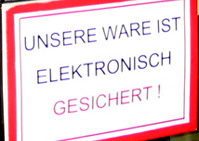 |
 |
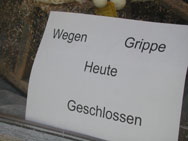 |
| Our wares are electronically secured. |
The playing of children and the parking of bicycles or baby carriages in the stairwell are strictly forbidden. |
Closed today on account of the flu. |
“Geboren
In saying when someone was born, German uses the statal passive for people still living, the regular passive for historical figures (For another explanation of this phenomenon,
- Wann sind Sie geboren? Ich bin 1984 geboren.
- Wann wurde Goethe geboren? Goethe wurde 1749 geboren.
In a formal curriculum vitae, however, one might say,
“Ich wurde am 17. Februar 1977 geboren.”
Substitutes for the Passive:
There are several ways to avoid a passive construction while achieving the same effect:
“man”: This construction uses the active voice but still manages to avoid identifying the subject:
| Man kann den Wagen leicht reparieren. |
One can repair the car easily. |
| Man schleppt den Wagen ab. |
One tows the car away. |
“sich lassen”: This construction often implies “können:”
| Der Wagen lässt sich leicht reparieren. |
The car is easy to repair/can be repaired easily. |
| Das Problem ließ sich nur schwer erkennen. |
The problem could be recognized only with difficulty. |
reflexive: with some verbs, there is an English equivalent, without the reflexive, but usually not:
| Der Wagen repariert sich leicht. |
The car is easy to repair. |
| Diese Sportschuhe verkaufen sich wie warme Semmeln. |
These athletic shoes sell like hotcakes [warm rolls]. |
| Wie schreibt sich dieser Name? |
How do you spell this name? |
| Das versteht sich von selbst. |
That goes without saying. |
“sein” + “zu”: This construction implies “können,” “müssen,” or “sollen,” and sometimes is equivalent to “is/are to” + passive:
| Der Wagen ist leicht zu reparieren. |
The car is easy to repair. |
| Diese Komplikationen waren nicht vorauszusehen. |
These complications couldn’t be foreseen. |
|
 |
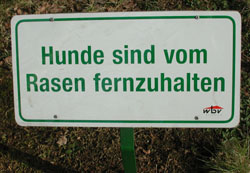 |
|
Dogs are to be kept off the grass. |
|
]]>






